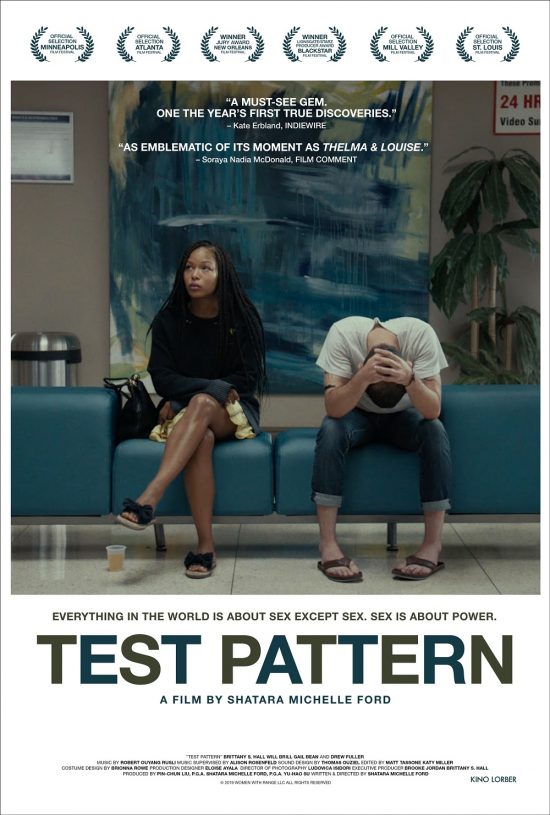Review: Test Pattern – “Essential viewing”

Brittany S. Hall and Will Brill in a scene from Test Pattern, courtesy Kino Lorber
According to a 2016 U.S. Department of Justice survey, 3 out of every 4 sexual assaults go unreported to police. Even more dismal is the statistic that out of every 1000 assaults, less than 5 perpetrators will actually end up incarcerated. If these statistics make you angry, they should, as should writer/director Shatara Michelle Ford’s debut feature, Test Pattern which follows a couple in the aftermath of an assault, and where the abysmal shortcomings of the health care and criminal justice systems come sharply into focus.
Evan (Will Brill) is quiet and unassuming, still lacking confidence despite the drinks in his system when he asks Renesha (Brittany S. Hall) for her number at a bar in front of her friends. He’s convinced that she’s out of his league, so much so that he never calls, a fact that Renesha seems readily annoyed with when they next run into each other at a grocery store. But that first date happens, and then another. Renesha, a professional with a graduate degree and a fancy apartment and Evan, a tattoo artist in perpetually ripped clothing, seem to be an unlikely couple. But their romance blossoms and their relationship is quickly established, the passage of time marked as tattoos appearing on Renesha’s arm.
Wanting to make a difference, Renesha quits the corporate job that she never seemed to like in order to start a new position at a local animal shelter. Evan makes her a big breakfast and lovingly sends her on her way, a tender moment that is a snapshot of his support and their affection for one another. After her first successful day, it’s not her intention to go out, but her best friend Amber (Gail Bean) convinces her to join her at a local bar. Despite Renesha asking him to come, Evan decides against it, letting them have a girls night. What starts as one small drink and conversation quickly turns when two men approach the women claiming to be celebrating the sale of their company. Pressure from them and encouragement from Amber quickly leads to more drinks and champagne and then a reluctant dance where Renesha’s head starts to spin in a well composed, disorienting, and dizzying scene that makes it abundantly clear she’s in a great deal of danger.
With only a few flashes of memory from the night before, Renesha is unceremoniously dropped off in the morning by the man who assaults her outside Amber’s house, where a worried Evan has been waiting. It becomes blatantly clear to Evan based on Renesha’s condition that the worst has happened, and while never angry at her he becomes overcome with the need to get justice for the assault of his partner. He has the best of intentions, but their dynamic is immediately changed, Renesha flinching at his slightest touch, and still sedated she just wants to go home. She’s had no time to even process what has happened.
Despite her reluctance, and unfortunately without asking what she really wants, Evan, now clearly on a mission, drives Renesha to the hospital to have a rape kit administered. This is where the central plot of the movie becomes clear – the first hospital doesn’t have a qualified nurse to perform the exam, the next health clinic doesn’t have rape kits at all. With time of the essence they follow a trail of disappointment and frustration and indignity as Evan time after time repeats their needs to the staff in front of waiting rooms full of people.
It’s here where Test Pattern excels at showing the differences between gender and race without ever blatantly explaining the issues. Evan, as a white man, has clear expectations of how the health care system should work and becomes increasingly embittered each time they are turned away. In a system that has been shown to treat Black patients, especially women, differently this is one more example of how it’s inadequately serving the population. Evan’s objective to get justice for Renesha comes to a head when he calls the police, something she pleads with him not to do and where her emotion and trauma that has been trapped inside her body finally escapes. She seems aware that her chances of closure on this assault are slim and that this day being driven from clinic to clinic is devastatingly futile.
Yet, this isn’t a movie that starts or ends with statistics (like this article) to drive home its points. Instead it specifically targets a very human story in the direct aftermath of an assault, the emotion and affects on the woman violated, as well as its affect on those around her. There are moments reminiscent of another deftly told story, Michaela Coel’s I May Destroy You (HBO), where lack of memory, matching DNA, and identification, as well as the bureaucracy of the systems that are supposed to protect, stand in the way of closure for those raped and assaulted. It’s a system that so seldom leads to justice.
With exemplary central performances from Hall and Brill, Shatara Michelle Ford expertly and gracefully navigates a layered and complex film that has much to unpack from its short 82 minute run time. Test Pattern is an experience with a unique perspective, exemplifying why we need more stories from women of colour. Her nuanced and detailed work has much to say, and Ford’s strong voice makes this film, simply, essential viewing.
Test Pattern is currently available for rental via Kino Marquee – from there you can find and support both this indie film as well as a theatre in your area.











